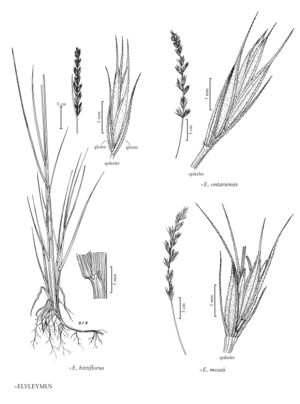Difference between revisions of "×elyleymus hirtiflorus"
FNA>Volume Importer |
FNA>Volume Importer |
||
| Line 19: | Line 19: | ||
-->{{Treatment/Body | -->{{Treatment/Body | ||
|distribution=Alta.;B.C.;Ont.;Sask.;Yukon;Wyo. | |distribution=Alta.;B.C.;Ont.;Sask.;Yukon;Wyo. | ||
| − | |discussion=<p>Bowden (1967) suggested that ×Elyleymus hirtiflorus consisted of hybrids between | + | |discussion=<p>Bowden (1967) suggested that ×Elyleymus hirtiflorus consisted of hybrids between Elymus trachycaulus and Leymus innovatus, and included in it plants from British Columbia. The name, however, is based on collections from the banks of the Green River, Wyoming, where neither putative parent grows. The more likely parents are E. lanceolatus and L. simplex. Admittedly, the short anthers argue for E. trachycaulus rather than E. lanceolatus as the Elymus parent. The Canadian specimens are here treated as belonging to ×Elyleymus ontariensis, a name that Bowden treated as a synonym of ×Elyleymus hirtiflorus.</p> |
|tables= | |tables= | ||
|references= | |references= | ||
| Line 35: | Line 35: | ||
|basionyms= | |basionyms= | ||
|family=Poaceae | |family=Poaceae | ||
| + | |illustrator=Bee F. Gunn | ||
|distribution=Alta.;B.C.;Ont.;Sask.;Yukon;Wyo. | |distribution=Alta.;B.C.;Ont.;Sask.;Yukon;Wyo. | ||
|reference=None | |reference=None | ||
| Line 40: | Line 41: | ||
|publication year= | |publication year= | ||
|special status= | |special status= | ||
| − | |source xml=https:// | + | |source xml=https://bibilujan@bitbucket.org/aafc-mbb/fna-data-curation.git/src/314eb390f968962f596ae85f506b4b3db8683b1b/coarse_grained_fna_xml/V24/V24_492.xml |
|subfamily=Poaceae subfam. Pooideae | |subfamily=Poaceae subfam. Pooideae | ||
|tribe=Poaceae tribe Triticeae | |tribe=Poaceae tribe Triticeae | ||
Revision as of 17:08, 30 October 2019
Plants rhizomatous. Culms 40-90 cm tall, 2-2.5 mm thick, glabrous. Leaves somewhat basally concentrated; sheaths smooth, glabrous; auricles 0.3-0.5 mm; ligules 0.2-0.5 mm, truncate; blades 5-20 mm long, 2-4 mm wide, usually involute, sometimes flat, abaxial surfaces smooth, glabrous or sparsely hairy, particularly towards the base, veins not prominent, adaxial surfaces scabridulous or scabrous, varying within a plant, all veins equally prominent, apices narrowly acute. Inflorescences spikes, 5-18 cm long, 8-10 mm wide, with 1-2 sessile or subsessile spikelets per node; internodes 4-5 mm, partially exposed on the sides, hairy. Spikelets 11-14 mm, to 23 mm including the awns, with 3-6 florets; disarticulation above the glumes, beneath the florets. Glumes 12-17 mm long including the awnlike apices, 1-3 mm wide, widest at about 1/4 length, 1(3)-veined, keeled, sparsely to densely hairy, hairs 0.3-0.5 mm; lemmas 8.5-10 mm, sparsely to densely hairy, hairs 0.3-0.5 mm, apices awned, awns 5-10 mm, straight; anthers 1.8-2 mm long.
Distribution
Alta., B.C., Ont., Sask., Yukon, Wyo.
Discussion
Bowden (1967) suggested that ×Elyleymus hirtiflorus consisted of hybrids between Elymus trachycaulus and Leymus innovatus, and included in it plants from British Columbia. The name, however, is based on collections from the banks of the Green River, Wyoming, where neither putative parent grows. The more likely parents are E. lanceolatus and L. simplex. Admittedly, the short anthers argue for E. trachycaulus rather than E. lanceolatus as the Elymus parent. The Canadian specimens are here treated as belonging to ×Elyleymus ontariensis, a name that Bowden treated as a synonym of ×Elyleymus hirtiflorus.
Selected References
None.
